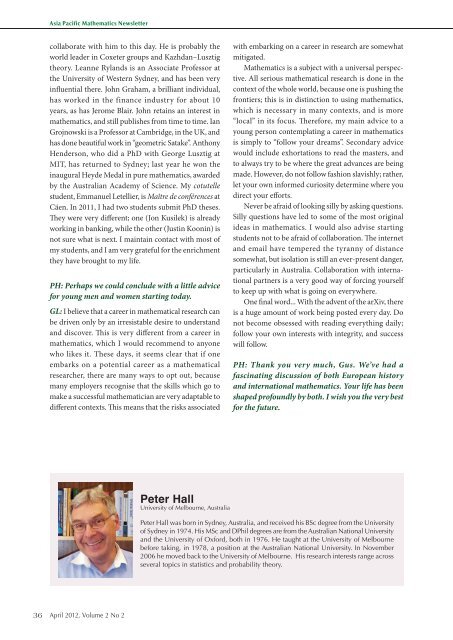Mathematics Newsletter
Mathematics Newsletter
Mathematics Newsletter
You also want an ePaper? Increase the reach of your titles
YUMPU automatically turns print PDFs into web optimized ePapers that Google loves.
36<br />
Asia Pacific <strong>Mathematics</strong> <strong>Newsletter</strong><br />
collaborate with him to this day. He is probably the<br />
world leader in Coxeter groups and Kazhdan–Lusztig<br />
theory. Leanne Rylands is an Associate Professor at<br />
the University of Western Sydney, and has been very<br />
influential there. John Graham, a brilliant individual,<br />
has worked in the finance industry for about 10<br />
years, as has Jerome Blair. John retains an interest in<br />
mathematics, and still publishes from time to time. Ian<br />
Grojnowski is a Professor at Cambridge, in the UK, and<br />
has done beautiful work in “geometric Satake”. Anthony<br />
Henderson, who did a PhD with George Lusztig at<br />
MIT, has returned to Sydney; last year he won the<br />
inaugural Heyde Medal in pure mathematics, awarded<br />
by the Australian Academy of Science. My cotutelle<br />
student, Emmanuel Letellier, is Maître de conférences at<br />
Cäen. In 2011, I had two students submit PhD theses.<br />
They were very different; one (Jon Kusilek) is already<br />
working in banking, while the other (Justin Koonin) is<br />
not sure what is next. I maintain contact with most of<br />
my students, and I am very grateful for the enrichment<br />
they have brought to my life.<br />
PH: Perhaps we could conclude with a little advice<br />
for young men and women starting today.<br />
GL: I believe that a career in mathematical research can<br />
be driven only by an irresistable desire to understand<br />
and discover. This is very different from a career in<br />
mathematics, which I would recommend to anyone<br />
who likes it. These days, it seems clear that if one<br />
embarks on a potential career as a mathematical<br />
researcher, there are many ways to opt out, because<br />
many employers recognise that the skills which go to<br />
make a successful mathematician are very adaptable to<br />
different contexts. This means that the risks associated<br />
April 2012, Volume 2 No 2<br />
Peter Hall<br />
University of Melbourne, Australia<br />
with embarking on a career in research are somewhat<br />
mitigated.<br />
<strong>Mathematics</strong> is a subject with a universal perspective.<br />
All serious mathematical research is done in the<br />
context of the whole world, because one is pushing the<br />
frontiers; this is in distinction to using mathematics,<br />
which is necessary in many contexts, and is more<br />
“local” in its focus. Therefore, my main advice to a<br />
young person contemplating a career in mathematics<br />
is simply to “follow your dreams”. Secondary advice<br />
would include exhortations to read the masters, and<br />
to always try to be where the great advances are being<br />
made. However, do not follow fashion slavishly; rather,<br />
let your own informed curiosity determine where you<br />
direct your efforts.<br />
Never be afraid of looking silly by asking questions.<br />
Silly questions have led to some of the most original<br />
ideas in mathematics. I would also advise starting<br />
students not to be afraid of collaboration. The internet<br />
and email have tempered the tyranny of distance<br />
somewhat, but isolation is still an ever-present danger,<br />
particularly in Australia. Collaboration with international<br />
partners is a very good way of forcing yourself<br />
to keep up with what is going on everywhere.<br />
One final word... With the advent of the arXiv, there<br />
is a huge amount of work being posted every day. Do<br />
not become obsessed with reading everything daily;<br />
follow your own interests with integrity, and success<br />
will follow.<br />
PH: Thank you very much, Gus. We’ve had a<br />
fascinating discussion of both European history<br />
and international mathematics. Your life has been<br />
shaped profoundly by both. I wish you the very best<br />
for the future.<br />
Peter Hall was born in Sydney, Australia, and received his BSc degree from the University<br />
of Sydney in 1974. His MSc and DPhil degrees are from the Australian National University<br />
and the University of Oxford, both in 1976. He taught at the University of Melbourne<br />
before taking, in 1978, a position at the Australian National University. In November<br />
2006 he moved back to the University of Melbourne. His research interests range across<br />
several topics in statistics and probability theory.


